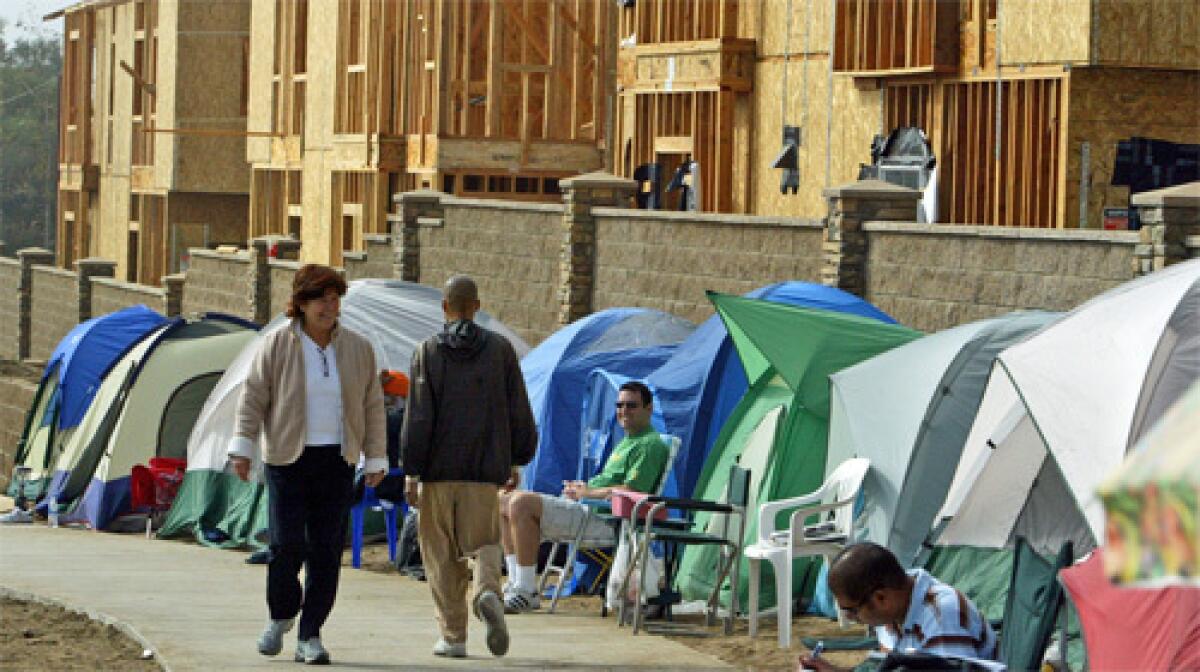Home sales, prices are down sharply

- Share via
Southern California home sales and prices plummeted again in December, solidifying a view among analysts that the housing slump will not end soon.
“I don’t expect it to get better in 2008,” UCLA economist Ryan Ratcliff said, citing prices that have fallen out of step with incomes and tightened lending standards.
The median sales price for Southern California houses and condominiums in December was $425,000, down from $435,000 in November and 16% below the peak of $505,000 set last year, DataQuick Information Systems reported Tuesday.
The number of homes sold last month fell 45% from a year earlier, to a level DataQuick called “by far the lowest” for any December since the firm began its data analysis in 1988.
The declining sales and prices continued a downturn that began last spring.
There is now wide agreement among economists that housing prices were inflated by the easy availability of mortgage loans to people who could not afford the payments.
As those loans go into default, it’s putting foreclosures on the market at discount prices -- further weakening home prices.
“There’s very little discretionary buying now,” said DataQuick analyst Andrew LePage, citing the “extremely low” sales volume.
The real estate market now is shaped by “people trying to avoid foreclosure, banks trying to unload [repossessed] houses and builders who need to move houses,” he said.
Throughout last year, many economists had taken care not to overstate the severity of the housing slump, noting that employment has remained strong. Past housing downturns usually followed a sharp rise in joblessness.
This time, USC economist Gary Painter said, extremely cheap credit led to dramatic price leaps as unemployment has held at low levels, so “we didn’t really have past history to judge what that could do to housing cycles. Now we know those prices were not sustainable.”
Painter believes home prices won’t recover before late 2009.
A recovery could follow interest rate cuts if prices also fall and incomes and inflation rise to eventually make property more affordable, but that would not happen quickly, Ratcliff of UCLA said.
“In the beginning of 2009 there might be some light at the end of the tunnel, but there’s always some tunnel left to go when you see the light,” he said.
Last month, DataQuick said, just 13,240 houses and condos were sold in Los Angeles, Riverside, San Diego, Ventura, San Bernardino and Orange counties, including new construction. That was 24% under the previous record-low December sales count in 1990.
The sharpest price drops were in Riverside County, where prices fell 18% from a year earlier, and San Bernardino County, which recorded a 15% decline.
December sales prices fell just over 10% in Los Angeles and Orange counties.
DataQuick President Marshall Prentice said the low median sales prices showed a drop in more expensive homes typically financed with “jumbo” mortgages greater than $417,000. Sales financed with jumbo mortgages were 22% of the total last month.
Before August, when credit standards tightened and jumbo loans became more difficult to obtain, 40% of Southern California home purchases were financed with such mortgages, DataQuick reported.
The typical monthly mortgage payment for homes purchased last month in Southern California was $1,985, down from $2,242 a year earlier. Adjusted for inflation, the current payment is 6.9% lower than in the spring of 1989, the peak of the prior real estate cycle. It is 21.2% below the current cycle’s peak mortgage payment of $2,422 in June 2006.
“It looks like anybody who can is waiting this thing out,” Prentice said of the sales slump.
That view is shared by Paul Schnee, a Coldwell Banker real estate agent in Hancock Park. Schnee said home sales were stalled because “sellers think their houses are worth more than they are and buyers think the market hasn’t reached its bottom yet.”
Schnee said both sides need to give up on trying to time the market -- sellers need to cut prices and buyers must be prepared to ride out short-term price declines.
“Hope is not a strategy,” he said.
More to Read
Inside the business of entertainment
The Wide Shot brings you news, analysis and insights on everything from streaming wars to production — and what it all means for the future.
You may occasionally receive promotional content from the Los Angeles Times.








